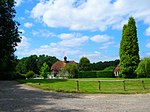Milland

Milland is a village and civil parish in the Chichester district of West Sussex, England. It is situated north of the A272 road on the border with Hampshire. In the 2001 census the parish covered 5,023 acres (20.33 km2) and had 332 households with a total population of 829 of whom 394 residents were economically active. At the 2011 Census the population was 891.The village lies along a section of the Chichester to Silchester Way Roman road, almost the only part to have survived in modern use. At the southern end of the village the boundary banks of a mansio, a Roman posting station on the road, are visible.The parish has an Anglican church, St. Luke's, the independent Milland Evangelical Church (MEC) and the disused Tuxlith Chapel which is in the care of a national charity the Friends of Friendless Churches.
Excerpt from the Wikipedia article Milland (License: CC BY-SA 3.0, Authors, Images).Milland
Rake Road, Chichester Milland
Geographical coordinates (GPS) Address Nearby Places Show on map
Geographical coordinates (GPS)
| Latitude | Longitude |
|---|---|
| N 51.03601 ° | E -0.80607 ° |
Address
Rake Road
Rake Road
GU30 7JS Chichester, Milland
England, United Kingdom
Open on Google Maps









